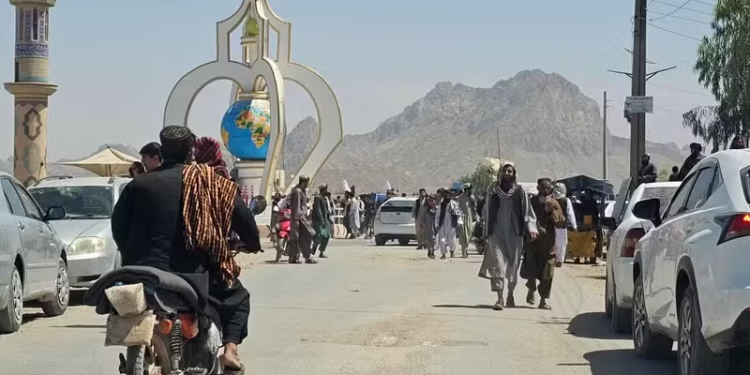On April 11, 2025, Afghanistan witnessed a stark reminder of the Taliban’s brutal vision of justice: four men publicly executed in stadiums across three provinces. The chilling spectacle, attended by tens of thousands, marks the highest number of executions in a single day since the Taliban’s return to power in 2021. For a regime that came to prominence in the 1990s by using public executions as a tool of fear, this is not a throwback but a continuation of its violent, authoritarian rule. The executions were carried out under the Taliban’s strict interpretation of Sharia law, an “eye-for-an-eye” system that aims not just to punish but to intimidate and control an entire population.
The Return of State-Sanctioned Terror
The Taliban’s use of public executions is not merely about punishment—it is about spectacle. These executions, often carried out in front of thousands in stadiums, are designed to serve as warnings to the Afghan people. They send a message: defy the regime, and you will face swift, public retribution. It is a brutal echo of the 1990s, when the Taliban’s first rule was marked by a relentless campaign of corporal punishment, including executions, amputations, and stoning.
The men executed on April 11 were convicted of murder under the Taliban’s “qisas” law, a principle of retributive justice that allows for executions in cases of murder, theft, and adultery. According to the Taliban, the men’s executions were the result of “carefully examined” judicial processes, though the fairness and transparency of these trials are highly questionable. The fact that these executions were conducted publicly adds an element of intimidation, further entrenching the regime’s stranglehold over Afghanistan.
A Global Silence in the Face of Brutality
While human rights organizations like Amnesty International have rightly condemned the executions, the international community has largely remained silent. For a regime that has shown no regard for basic human rights, this silence is deeply troubling. The world has witnessed the brutal realities of the Taliban’s rule, yet it continues to engage diplomatically and economically with the regime, prioritizing strategic interests over the lives of ordinary Afghans.
The lack of a decisive global response allows the Taliban to persist in its repression with impunity. Instead of holding the regime accountable, many nations, particularly those with geopolitical or economic interests in Afghanistan, have refrained from taking meaningful action. This inaction sends a dangerous message: that the lives of Afghans are expendable, that the international community is more willing to appease a brutal regime than to take a stand for justice.
The Broader Middle Eastern Context: State Violence in the Name of Law
Afghanistan is not alone in its use of the death penalty as a tool of political control. In neighboring countries like Iran, Saudi Arabia, and Iraq, the death penalty continues to be employed regularly, often in public, despite widespread international condemnation. These executions are presented as a form of justice, but in reality, they are an exercise in state-sanctioned terror designed to suppress dissent and instill fear.
Yet the global response to such practices is inconsistent. While Afghanistan’s executions have drawn the attention of human rights groups, countries like Saudi Arabia—where executions occur with chilling frequency—continue to receive tacit approval or limited condemnation. The hypocrisy of the international community’s response to state violence in the Middle East must be confronted if meaningful change is to be achieved.
The Afghan People’s Struggle for Dignity
Despite the Taliban’s iron grip on power, Afghanistan’s people—especially women and activists—continue to resist. The country’s deepening crisis has sparked a growing underground movement, as people refuse to accept the brutal oppression of their rights. But their struggle cannot succeed without the international community’s support.
The Afghan people need more than just words of condemnation. They need action. This means holding the Taliban accountable, increasing pressure through sanctions, providing humanitarian aid, and offering refuge to those at risk. The world cannot continue to watch from the sidelines while the Taliban carries out atrocities with little to no consequence.
Time for the World to Act
The public executions of April 11 are a stark reminder of the Taliban’s brutal commitment to fear-based rule. These acts of violence are not isolated—they are part of a calculated strategy to control a population through terror. The international community must stop turning a blind eye to Afghanistan’s suffering and demand an end to the Taliban’s reign of brutality.
The time for passive condemnation is over. The world must take a firm stand—through diplomacy, humanitarian aid, and sanctions—if it is serious about supporting the Afghan people and holding the Taliban accountable for its actions.
Relates stories:
UN Rights Chief Condemns Afghanistan’s Ban on Women’s Education and Jobs
Bacha Bazi: The Sexual Exploitation of Young Boys Continues in Afghanistan Under Taliban
Taliban Withdraw Afghanistan From International Criminal Court
Taliban Minister Flees Afghanistan After Supporting Girls’ Education
















